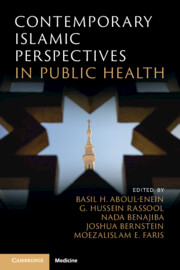Book contents
- Contemporary Islamic Perspectives in Public Health
- Reviews
- Contemporary Islamic Perspectives in Public Health
- Copyright page
- Contents
- Contributors
- About the Editors
- Acknowledgments
- Chapter 1 Introduction to Islam
- Chapter 2 The Qur’an and Prophetic Guidance: An Overview in the Context of New Public Health
- Chapter 3 Islamic Applications towards Public Health Policies: A Brief Perspective
- Chapter 4 Islamic Prayer (Salat) and Health
- Chapter 5 Perceptions of Health Behaviors and Illness in Muslims
- Chapter 6 Social Justice, Human Rights, and Equality: An Islamic Perspective
- Chapter 7 Public Health, Hygiene, and Islam
- Chapter 8 Foods of the Qur’anic Garden: An Islamic Perspective
- Chapter 9 Recommended Eating and Dietary Practices in Islam
- Chapter 10 Islamic Food Law and Dietary Restrictions
- Chapter 11 Ramadan Intermittent Fasting: A Contemporary Health Perspective
- Chapter 12 Promoting Oral Health: Influences of Hadith and Sunnah
- Chapter 13 Coping and Mental Health: Islamic Practices and Beliefs
- Chapter 14 Maternal and Child Health: An Islamic Perspective
- Chapter 15 Immunization and Islamic Guidance
- Chapter 16 Sexual and Reproductive Health: An Islamic Perspective
- Chapter 17 Zakat and Waqf: Towards Achieving Sustainability, Health, and Well-Being
- Chapter 18 Earth and the Environment: Islam and Stewardship
- Chapter 19 Sleep and Health: An Islamic Perspective
- Chapter 20 Addictive Behaviors and Public Health
- Chapter 21 Highlighting the Concepts, Principles, and Values of Communication: A Brief Islamic Perspective
- Chapter 22 Contemporary Public Health, Islam, and Positive Health
- Chapter 23 Cultural Competence in Public Health: A Brief Islamic Perspective
- Chapter 24 Muslims and Non-Muslims: Perspectives on Immigrant and Minority Health
- Chapter 25 Challenges and Solutions in Public Health: An Islamic Perspective
- Index
- References
Chapter 5 - Perceptions of Health Behaviors and Illness in Muslims
Published online by Cambridge University Press: 02 January 2025
- Contemporary Islamic Perspectives in Public Health
- Reviews
- Contemporary Islamic Perspectives in Public Health
- Copyright page
- Contents
- Contributors
- About the Editors
- Acknowledgments
- Chapter 1 Introduction to Islam
- Chapter 2 The Qur’an and Prophetic Guidance: An Overview in the Context of New Public Health
- Chapter 3 Islamic Applications towards Public Health Policies: A Brief Perspective
- Chapter 4 Islamic Prayer (Salat) and Health
- Chapter 5 Perceptions of Health Behaviors and Illness in Muslims
- Chapter 6 Social Justice, Human Rights, and Equality: An Islamic Perspective
- Chapter 7 Public Health, Hygiene, and Islam
- Chapter 8 Foods of the Qur’anic Garden: An Islamic Perspective
- Chapter 9 Recommended Eating and Dietary Practices in Islam
- Chapter 10 Islamic Food Law and Dietary Restrictions
- Chapter 11 Ramadan Intermittent Fasting: A Contemporary Health Perspective
- Chapter 12 Promoting Oral Health: Influences of Hadith and Sunnah
- Chapter 13 Coping and Mental Health: Islamic Practices and Beliefs
- Chapter 14 Maternal and Child Health: An Islamic Perspective
- Chapter 15 Immunization and Islamic Guidance
- Chapter 16 Sexual and Reproductive Health: An Islamic Perspective
- Chapter 17 Zakat and Waqf: Towards Achieving Sustainability, Health, and Well-Being
- Chapter 18 Earth and the Environment: Islam and Stewardship
- Chapter 19 Sleep and Health: An Islamic Perspective
- Chapter 20 Addictive Behaviors and Public Health
- Chapter 21 Highlighting the Concepts, Principles, and Values of Communication: A Brief Islamic Perspective
- Chapter 22 Contemporary Public Health, Islam, and Positive Health
- Chapter 23 Cultural Competence in Public Health: A Brief Islamic Perspective
- Chapter 24 Muslims and Non-Muslims: Perspectives on Immigrant and Minority Health
- Chapter 25 Challenges and Solutions in Public Health: An Islamic Perspective
- Index
- References
Summary
The increased visibility of the Muslim population suggests the need for health care professionals to gain a better understanding of how the Islamic faith influences health-related perceptions and health care-seeking behaviors. From an Islamic perspective, health is viewed as one of the greatest blessings that God (Allah) has bestowed on humankind. In Islam, illness has three possible meanings: a natural occurrence, punishment of sin, or a test of the believer’s patience and gratitude. Muslims believe that cure comes solely from Allah, even if this is practically in the form of a health professional. Ill health is part of the trials and tribulations of Muslims and a test from Allah. Understanding Muslim patients’ beliefs and health practices, customs, and religious beliefs would be prime factors in the delivery of sensitive and culturally appropriate care to enhance positive health outcomes.
- Type
- Chapter
- Information
- Contemporary Islamic Perspectives in Public Health , pp. 31 - 36Publisher: Cambridge University PressPrint publication year: 2025

